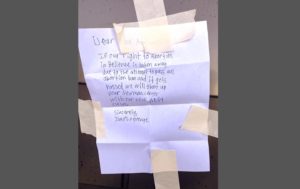Time to admit that social media is complicit in school shootings
As the nation shakes it’s collective head in disbelief over another school shooting, social media companies once again avoid shouldering their share of the blame for the violence.
One should be…

As the nation shakes it’s collective head in disbelief over another school shooting, social media companies once again avoid shouldering their share of the blame for the violence.
One should be careful about quickly parceling out blame after tragedies like the one at Covenant School in Nashville.
But it’s about time that the country had an adult conversation regarding the negative consequences that have attended the rise of social media, particularly when it comes to school shootings.
Today, school shootings are the most viral thing a person can do in a society that worships the ability to get attention, whether it’s good or bad attention.
Shootings are just more fodder for an irresponsible social media that is fed by algorithms that turn people, especially children, from raw data into fodder.
It’s the TikToking of mass murder, where mass attention isn’t just something, but everything.
If you’re angry or you’re upset and you want attention, the easiest thing you can do to go viral is walk into a school and start shooting.
Liberal and conservative media can argue about whether the public would be better served to release or not release the manifesto written by the Covenant shooter, 28-year-old Audrey Hale.
But one fact is obvious: Without social media’s unique ability to widely distribute such hateful materials – while disclaiming total responsibility for their distribution – Hale’s manifesto most likely would not have been written.
Today, seven human beings, in all probability, would be alive.
And it’s not just such manifestos that feed the shooting phenomena; it’s all the other accoutrement that goes along with these shootings too.
It’s the dramatic audio recordings and body cam videos.
It’s the scenes from outside the schools.
It’s the SWAT-like searches of perpetrators’ homes and apartments.
And it’s anything else that can be summed up in 280 characters, accompanied by pictures, that can dominate the 16-hour news-cycle with clicks and likes and shares, which combine to make up the virtual approval process of social media.
It’s as if, for social media, human beings are only necessary as victims, targets and as lobbyists to the federal government, thanks to the all-powerful algorithms that rule them.
No doubt, free speech and the First Amendment ought to rule in 99.9% of cases on social media.
But, it tells us a lot about their priorities that these platforms could be so inventive in banning political speech during the 2020 presidential campaign, yet somehow they can’t find a way to stop glorifying, publicizing and capitalizing on people who commit capital murder to glorify themselves.
This, despite the fact that there is growing scientific evidence that social media tends to feed mental illness, especially in the young.
And the data also confirms that social media is most definitely complicit in the spread of mass shootings.
Fifty years ago, it would’ve been inconceivable that a TV, radio or print newsroom would’ve given the same kind of coverage to shootings – and the shooters responsible – that social media routinely gives them today.
That’s because, in the old days, people who made publication decisions had to live in the communities they served. Thus, they acted more responsibly.
Today, it’s unclear, even inside social media companies, who is really making any of the decisions. And, whoever it is, they certainly don’t live near you and me.
So, it’s no surprise that social media cannot fix itself.
One state however, is not waiting for a solution from the companies themselves.
Utah just made history by being the first in the country to require parental consent for minors to sign up for social media accounts, while also limiting how these companies market to children.
They also established curfews for minors using these platforms, a long overdue reform.
But the legislation in Utah is just a first step. By itself, it won’t stop the phenomenon of mass shooting contagion that has been fostered, in part, by these platforms.
Maybe, however, it will serve as a call to the social media companies themselves to start taking this problem more seriously.
Most importantly, it can also help nudge them to start taking the welfare of their community at least as seriously as they’ve taken their activism in progressive politics in the past.



